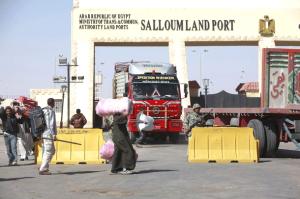Egypt showed great flexibility during negotiations over the past 10 years, hoping for reaching a fair and legally binding agreement regarding the filling and operation of the Grand Ethiopian Renaissance Dam (GERD).
The remarks were made by Egypt’s Ministry of Water Resources and Irrigation in a Monday evening statement. It noted that Ethiopia is heading to a second filling of the dam, despite the GERD not being ready for generating electricity.
It added that Ethiopia continues its approach of imposing a fait accompli policy, by taking unilateral measures that could cause harm to the two downstream countries, Egypt and Sudan.
The ministry said that the Ethiopian claim that the two recently constructed Bottom Outlets (BOs) are capable of passing the average flow of the Blue Nile is incorrect. This is due to the current capacity for disposal not exceeding 50 million cubic metres per day for both outlets.
This quantity does not meet the needs of the two downstream countries and is not equivalent to the average flow of the Blue Nile.
The Ministry of Water Resources and Irrigation’s remarks come on the back of Ethiopian Minister of Water, Irrigation and Energy Seleshi Bekele’s announcement, on Sunday, that construction on two bottom outlets (BO) at the dam had been completed.
Bekele claimed that the two BOs provide a release of water downstream, and have the capacity of passing the entire annual Blue River flow in a year. He added that the outlets provide assurances that the flow of water downstream is at no time interrupted.
In a series of tweets on Sunday, the Ethiopian minister also said that an additional 13 outlets are under construction.
As Addis Ababa insists to commence the 2nd filling in July, Cairo says that the implementation of the step this year and the seizure of large quantities of water will affect the River Nile system. Cairo also noted that these outlets will be the only control of water discharge during the filling process.
The situation will become more complex starting from the flood season in July, as the outlets will release a lower discharge than usual to receive in July and August.
The maximum discharge of the low outlet is estimated at 3 billion cubic metres per month, assuming that the level of 595 metres is reached. This means that both Sudan and Egypt are likely to suffer in the event of a medium-sized flood.
According to Egypt’s Ministry of Water Resources and Irrigation, the situation will worsen in the event of a low flood. It confirms the inevitability of a legally binding agreement that includes a clear coordination mechanism.
In 2012 and 2015, Egypt requested increasing the number of outlets to meet the needs of the downstream countries, and offered to finance the incremental cost, but Ethiopia said the current outlets are sufficient.
Egypt explained that Ethiopia is constructing the dam in an improper manner, including: constructing modifications on the saddle dam; changing the level of outlets; removing three turbine outlets; reducing the number of turbines from 16 to 13; and many other remarks.
Meanwhile, Ethiopia called upon UN Security Council members to urge Egypt and Sudan to return to tripartite negotiations on the first filling and operation of the GERD. It said that this should take place “in the spirit of finding African solutions to African problems.”
In a statement on Sunday, Ethiopia’s Ministry of Foreign Affairs recalled Addis Ababa’s initiative on data exchange before the commencement of the second filling of the dam. It also accused Egypt and Sudan of not negotiating in good faith, and internationalising the issue to exert undue pressure on Ethiopia.
Early in April, Egypt officially announced the failure of the latest round of negotiations on the GERD which were held in the capital of the Democratic Republic of Congo (DRC), Kinshasa, on 4-5 April.
Both Egypt and Sudan announced their intention to resort to the UN Security Council. The move is aimed at preventing Ethiopia from taking any unilateral actions that may cause harm to the downstream countries.

